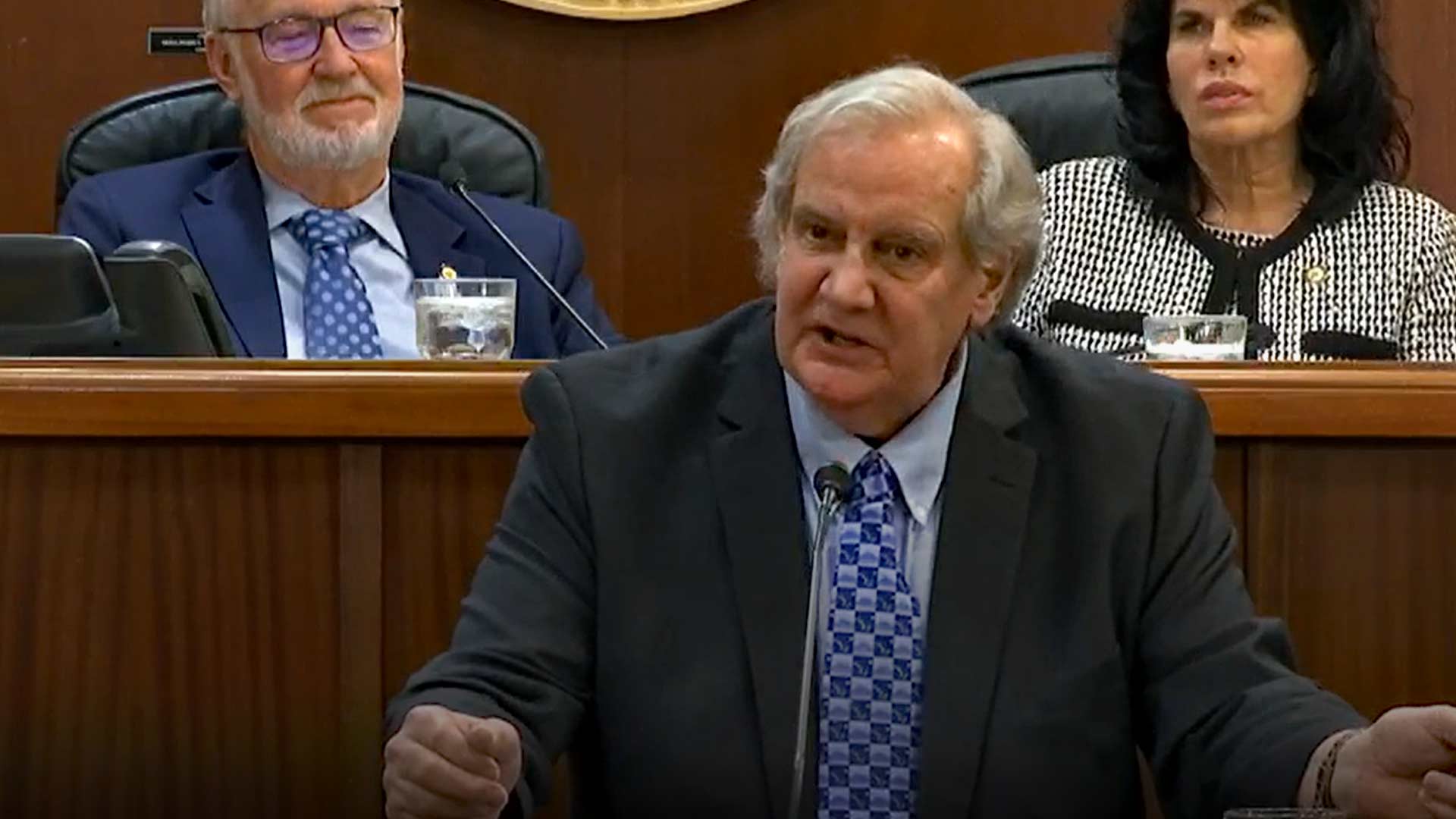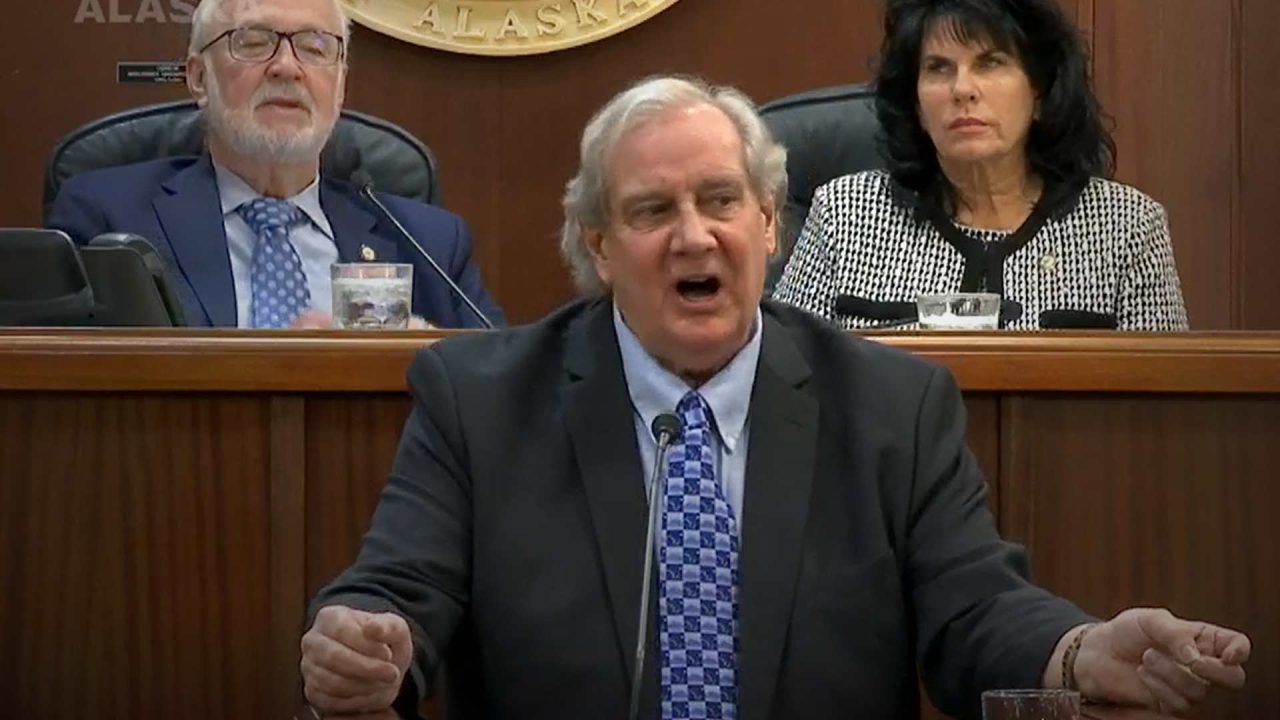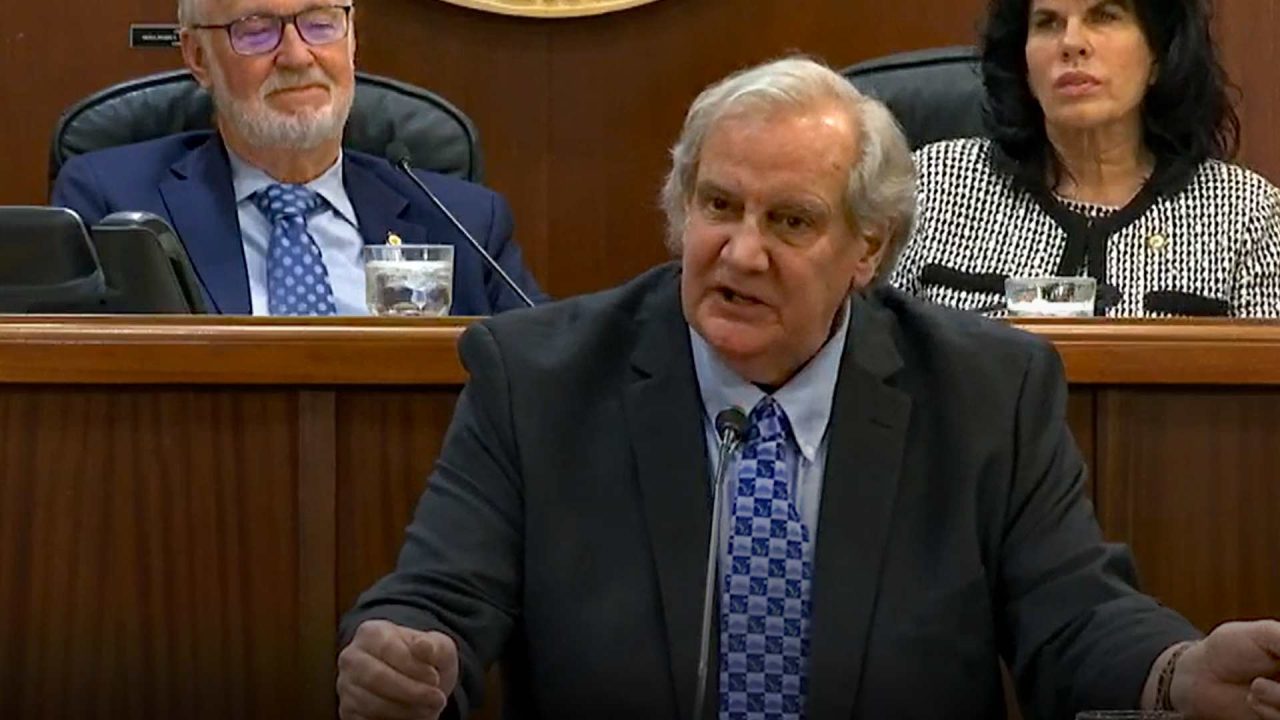

In his final State of the Judiciary address to a joint session of the Alaska Legislature, a visibly annoyed Chief Justice Daniel Winfree lashed out against anyone who dares to criticize the courts, or suggest that judges might be politically motivated in some of their decisions.
His Feb. 1 State of the Judiciary address in Juneau began routinely enough, with a run down on staffing and backlog challenges and successes that Alaska courts have seen with new technology and expanded hours.
With the approach of his 70th birthday this month, Justice Winfree is constitutionally required to step down, which he will do on Feb. 6 when Justice Peter Maassen takes over as chief justice.
In his last major public appearance, however, Winfree appeared defensive, and at times angered by critics who claim that some judges are political “activists.”
He began by attempting to draw distinctions between politicians and judges, asserting that lawmakers engage in heated political disputes as they solicit campaign contributions and discern the political winds of the day.
“I couldn’t do what you do,” Winfree said. “It’s not my makeup.”
“I want to contrast how you go about your business and we go about ours,” he added.
Politicians, Winfree said, must listen to constituents, seek information from outside sources, check opinion polls, and then pursue policies that either mesh with constituents or help their own reelection plans.
Winfree characterized this process as “transactional politics and majority rule,” both of which he warned can threaten minority rights and privileges.
“What constrains political-transaction majority rule?” he asked.
Winfree answered that the Alaska Constitution serves as a legal “riverbank.” Politicians can do whatever they want, so long as they don’t “unilaterally alter” or attempt to “jump” the riverbanks.
He then cast himself and those in the judicial branch as guardians of the riverbank, ensuring that everyone operates within the fixed rule of law.
Winfree noted that judges are, at times, asked to resolve high profile political disagreements, such as redistricting challenges, turf wars between the Legislature and governor, citizen challenges to legislatively enacted statutes and disputes over the legality of certain voter initiatives and referendums.
In deciding these controversies, Winfree said judges make a conscious effort to “put aside personal views and public opinion.”
Unlike politically motivated politicians, Winfree said judges don’t “go asking our friends and confidants how we should rule. We don’t conduct opinion polls to see how people think we should rule or how people will react to a ruling. We don’t check with our friends in the Legislature or executive branch to see what they think about it. We consider only the evidence presented in the court, the relevant law, and we disregard everything else that could inappropriately influence the outcome.”
He proceeded to deride “most people” who criticize judicial decisions as being ignorant and basing their information “solely on how their internet sources characterize the resu
To do otherwise, he said, would draw into question the judiciary and the rule of law.
At this point, Winfree expressed anger and frustration at anyone who dared suggest that perhaps politics does – on occasion – play a role in judicial decisions.
“Now some of you are thinking, I’m sure, ‘What a crock. Of course, politics are at play in our decisions, and we really are just a bunch of activists judges,’” Winfree said. “But I believe that’s because you see everything through a transactional, political lens. You see a political dispute, and conclude that any decision we might make on it must be political.”
Winfree adamantly defended himself, saying he only ever considers the law and the facts in reaching legal opinions.
He suggested that accusing a judge of being an “activist” is just a means of casting aspersions against a “judge who rules against you.”
“Because the losing side is always – always – certain that it couldn’t possibly have been wrong in its interpretation of the facts or the law,” Winfree lectured the assembled lawmakers.
He proceeded to deride “most people” who criticize judicial decisions as being ignorant and basing their information “solely on how their internet sources characterize the result, without ever reading or caring about our written explanation of the relevant facts and the law and why we came to our decision.”
He later denounced those who have suggested that Alaska should revisit the way it selects and appoints judges, saying their true aim is to undermine the judicial branch.
“If they don’t like the result, we’re either corrupt, incompetent, or even worse – radical liberal activists, radical conservative activists. You name it, that’s what we are,” he said. “When they like the result, we’re incredibly smart, wonderful or at least a blind pig who can find a truffle.”
Winfree continued to scold those “who should know better,” and yet continue to stir criticism against judges.
He later denounced those who have suggested that Alaska should revisit the way it selects and appoints judges, saying their true aim is to undermine the judicial branch.
In recent years, many conservatives have advocated for a system that resembles the federal government – one in which the president nominates, and lawmakers vet and confirm appointees. Others have suggested that Alaska allow citizens to elect judges directly, as many other states currently do.
Winfree doggedly defended Alaska’s current system in which an unelected seven-member Alaska Judicial Council enjoys sole authority to determine who the governor can choose from among when appointing judges.
ALASKA WATCHMAN DIRECT TO YOUR INBOX
To veer from this status quo, is to oppose an “independent judiciary,” Winfree asserted.
“I recognize that some here don’t believe in an independent judiciary, but rather believe that Alaska’s judges should be hand picked and controlled by politicians so that the judges will render decisions that the politicians want,” he said.
He added that these ideas were ultimately rejected by Alaska’s original constitutional convention delegates in favor of the current system.
“The delegates wanted politics out of the judicial selection process, all the way up to the governors’ constitutionally authorized appointment of a judge from a list of the most qualified applicants provided by the Alaska Judicial Council,” Winfree said.
He failed to mention, however, that there was also considerable debate among the constitutional delegates about the immense power that were bestowing on the seven-member Alaska Judicial Council in allowing such a small group of unelected lawyers shape an entire branch of state government.









45 Comments
This is why I believe all state and federal employees should have term limits. The position of a Judge should never be a lifetime appointed position, “absolute power, corrupts absolutely”.
Agree!!
Absolutely! The only way to keep power from corrupting is to limit the amount of time someone is in power- in any of the branches.
Agreed.
Military included.
Maureen, you sure seem to have a sour disposition against the military. I, for one, am thankful for our military men and women who have served and have put in enough time for retirement. We have good skills and experience from many of those folks and I am counting on them to step forward and help this country with their skills and expertise if it is needed. I have retired Navy family who enjoyed the time that they served for our country and their skills could certainly be useful if called upon during a crisis.
Maureen, why is the military a strong focus of your comments? I cannot get a picture of your angle here.
100%.
Crazy when the top judge in state takes offense, umbrage and derides anyone who dares question a legal decision.
I am a FREE citizen that is allowed to question ANY political or legal decision. I will not be silenced by some old codger that thinks he is above being questioned or judged.
All of these bums need to go.
I have lost trust in the Alaska Judicial system, not from listening to politicians, but from my own experiences and research. The Alaska Judicial Council non-attorney member selections should come directly from the Governor – not from the Alaska BAR. They have TOO MUCH POWER and it needs to change. On the other hand, I am very glad they have heard the peoples cries even though they disagree. Keep going grassroots!
Sitting judges should have absolutely no say in the appointments, or recommendations of appointments of any future judge.. That’s no different from a hen house full of Rhode Island reds saying a Black Minorca can’t be allowed in the house because they don’t like how it lays eggs… But the bottom line is, no sitting judge should have any say in the seating of a judge, whatsoever. Their job,.. responsibility,.. is to adjudicate the case(s) before them… Period.
I understand you would be good with grocery baggers picking who should be (your) heart surgeons.
Maureen, apparently, you understand very little.. Especially when it comes to the judiciary, and the legal landscapes.
Interesting projection Lobo.
my main concern is the jurisdiction the courts are moving under in all cases, there’s only 3 jurisdictions in the constitution courts may operate. 1 common law, 2 equity which has to do with civil actions, 3 admirlty/maritime jurisdiction which has to do with the high seas. But the courts are moving under a statutory jurisdiction, witch is not backed by nor any document that would validate the statutory jurisdiction on the land of the united states. the courts are only there to collect revenue for the bankruptcy of the Federal government corporations and not for we the people.
Judges are far from perfect. I have not spent a lot of time in court rooms but during the little time I have spent in them I have seen and heard judges say/do some really bad things. One judge actually said that in over 20 years he had never heard a domestic violence case that wasn’t the womans fault- not one. I was ordered to testify in a child abuse case. The judge would over rule every question we were asked about the abuse we had wittnessed. He only heard the mothers side. She was allowed to keep her 6 children. Their childhoods were ruined and their adult lives severly handicapped by what they endured. One is probably going to spend his life in prison and he was a a really good little kid. Two, now in their late 30’s are in and out of mental institutions and probably well be for the rest of their lives due to the abuse. Another one seems to be coming out of it but only after spending15 years in prison. Of the remaining two they can’t maintain relationships or jobs and one lost her children due to neglect. All because a judge refused to listen to what numerous people had seen on various occasions. Maybe there needs to be a group of citizens who are not employed in a legal profession who could investigate complaints. As far as I know there is no accountability for judges but there should be something.
This is disgusting that the People have no power to get rid of these criminals sitting on the bench. Who can remove them if Dunleavy does not have power and the people do not have the power?
We DO have the power. In the form of our grand juries. In fact, there is a GJ currently hearing evidence in Kenai on the corruption in our Judicial system. Winfrey and the other Robes on the Ak Supreme Court got word of the GJ’s subpoenas being handed out which cause the Justices to panic. They unilaterally ignored members of the Rules committee that openly worried that the Supreme Court was overstepping its Constitutional boundaries. Nevertheless, they essentially wrote new law that claims Grand Juries can NOT indict without the courts approval of those investigated. Clearly a violation of the Ak Constitution, State Statute, and contrary to our Constitutional Delegates wishes.
The Supreme Court members of Alaska should resign or be impeached!
Rog, that is just it – the supreme court wrote new law protecting themselves. At this point, we have no power as long as those corrupt judges can keep writing new laws to protect themselves. How are we going to impeach if we are not able to? I see this state going down the communist/marxist road and Dunleavy is in on the take-down to protect his own life and family. What he does not realize is that when he has done everything they wanted and he is no longer useful to them, he may get put out to permanent pasture along with the rest of us.
DERIDE ALL YOU WANT… WE KNOW YOUR CORRUPT….
You tell me that the Supreme Court doesn’t lean liberal when they reject conservative applicants, when they allow a governor to mess with the PFD, and when they say that there needs to be no witnesses for a mail-in ballot. Yup, not buying your righteous anger, old codger.
Thanks for serving, enjoy your retirement.
Also, thanks for letting your temper get the best of you and prattle on, on exactly why we need to change the selection process for Judges.
Your Honor, you said it yourself, three members of a private club, called the Alaska Bar Association and YOURSELF…. PICK THE GOVERNOR’S CHOICES FOR JUDGESHIPS ‼️ I’d hardly call that unbiased. Actually I’d call that extremely prejudicial, at the bare minimum.
YOUR HONOR, I COULD PROVIDE PLENTY WITNESSES THAT THROUGH LIFE EXPERIENCE WILL TESTIFY IT’S MORE THAN FOOLISH LETTING THE FOX GUARD THE HEN HOUSE. ( Read that as, lawyers and judges drinking from the same bottle)
I’d like to point out, TERM LIMITS WORK‼️‼️
Citizens need to rise up and reject tyrants! I say that recognising when we do we will also incur the wrath of those in charge! This is precisely why a majority must rise up in unison!
ARE YOU READY?
The fix is in on the rule of law here in Alaska. To start with winsbag winfree, you fix who becomes judges, thats the first law you broke, impartiality. From there, the rest were easy for you as you underminded we the people. Long live the commies that rule from the bench with a leftist communist slant and then they have the audacity to blame us!. Windbag winfree, you stomped all over our constitution and all our rights gleefully as you packed our courts. Dont let the door hit you on the way out Windbag Winfree. We dont think you are unfair in SOME of your legislation, we know you are corrupt to the core and you WERE unfair in ALL your decisions. Face it, you hate all of us that dont agree with your communist leftist unlawful decision making. YOU are calling US out? When did you give any of us conservatives a fair chance…. Good riddance to bad windbaggage winfree. You proved our point.
I’ll say this, we finally get rid of Chief Justice Winfrey. Thank GOD the framer wrote the 70 years clause into our Constitution. To bad that don’t apply to the Federal government too. It’s obvious Winfrey knows he is total wrong here by his reactions. He’s covering in a ladt ditch effort to help his lieing cheating other judges out. Facts? Facts are, you allowed a total breach of the Constitution by taking the power away from grand jury’s. That is the fact. I call for an independent outside investigation of ALL the judges. Unbiased, never in Alaska. The Alaska Judicial Counsel is corrupt. They send bias judges to the governor so they can keep power over all the people. It’s time to replace them too. The whole system of judges is corrupt in Alaska. I always vote NO to retain all of them. If we had term.limits this bias would not happen. Complacency sets in after a time and bias/corruption is the results. I call for a Constitutional Convention to fix these matters. Alaska can’t go on like this anylonger. Thank you!
Now days the judges also decided whether the river is flowing up or down the stream, and whether the river should flow at all, which is activism!
Every way of a man is right in his own eyes, but the Lord weighs the heart” prov 21:2
Every government position should have term limits, whether it is in DC, Alaska, or your borough. No term limits leads to power. And yes, power corrupts and absolute power corrupts absolutely. When election time roles around, if a judge has been on the bench for aing time I always vote non retention. But, of course they are always retained.
He has a high opinion of himself and an astoundingly low opinion of the rest of us. Judicial reform is needed.
I can’t imagine that any of these great comments were written by citizens who voted “NO!” for the con-con. The Judge knows that it lost only because Geo. Soros bought and paid for the outcome. He fears a different future. It would seem that liberals don’t always favor change.
Mr. Bird, a different future would sure be nice! A future where Soros and all of those working to bring down humanity are gone.
The lynchpin is no oversight in a legislative confirmation process. Legislators are elected to represent the People. There is no representation of the People with the current model of Judicial Counsel.
If this guy is jumping up and down and screaming that judges aren’t corrupt, then judges are much more corrupt than we ever imagined.
And he WAS their leader!
Absolute power corrupts absolutely. Winfree is living proof.
We are finally free of winbag winfree, tho we all know, due to their selection process, that the next one will be worse, they always are.
JIMMY HOFFA’S TEAMSTERS WERE ALTAR BOYS COMPARED TO THE ABA.
I joined Alaska’s so-called justice system in the early 1970’s when reports were received of Danny Winfree and his posse mischievously pulling their pants down to moon girls at the end of the school day at Lathrop high school.
Not seeing much improvement in acceptable behavior by Winfree as a Supreme Court Justice since then, I have to agree with so many others, that Winfree’s Feb. 6 resignation is the most significant contribution he has ever made to the Alaska justice system.
In his farewell speech, Winfree derided those who claimed judges are acting as activists and are politically influenced. However, Winfree did not address the Supreme Court’s participation in his union’s fraud committed against insurance companies, and the court-approved thefts from litigants by Winfree’s self-policed union buddies.
Now Chief Justice Peter Maassen, Winfree’s ‘best friend’ of 40 years with matching ethical and moral deficiencies, has indicated that he, as the Alaska Bar Association union’s new boss, will not interfere with the ABA’s profitable criminal fraud schemes.
Just remember. Kevin Meyers DOMINION machines keep these creeps in power..
Alaska Chief Justice Daniel Winfree is whistling into the wind..
If The Alaska Judicial Council worked under FAIR Rules for judge selection, Winfree probably would have never made the bench way back when. He is a gas bag just lipping off. Pay him no attention.
JIMMY HOFFA’S TEAMSTERS WERE ALTAR BOYS COMPARED TO THE ABA.
I joined Alaska’s so-called justice system in the early 1970’s when reports were received of Danny Winfree and his posse mischievously pulling their pants down to moon girls at the end of the school day at Lathrop high school.
Not seeing much improvement in acceptable behavior by Winfree as a Supreme Court Justice since then, I have to agree with so many others, that Winfree’s Feb. 6 resignation is the most significant contribution he has ever made to the Alaska justice system.
In his farewell speech, Winfree derided those who claimed judges are acting as activists and are politically influenced. However, Winfree did not address the Supreme Court’s participation in his union’s fraud committed against insurance companies, and the court-approved thefts from litigants by Winfree’s self-policed union buddies.
Now Chief Justice Peter Maassen, Winfree’s ‘best friend’ of 40 years with matching ethical and moral deficiencies, has indicated that he, as the Alaska Bar Association union’s new boss, will not interfere with the ABA’s profitable criminal fraud schemes.
Winfree would have been better off shutting up. He exposed his pompous narcissistic nature: “How dare you question us.” “Who do you think you are?'” The courts in Alaska are corrupt without accountability to anyone. A good judge could be trusted to honor the rule of law and not the “living constitution,” and respect our opinions in order to make the courts better. A good judge unlike Winfree and his colleagues who have been appointed would have unquestionable integrity. Alaska would be better for it. Gov. Dunleavy was right to slash their salaries in his power of line item veto. Then the judges decided he did not have line-item veto power. The judiciary overrode the executive branch. They did not want the governor interfering with their free flow of cash.
These judges know they are in trouble…..We support the efforts of the Alaska Grand Jury Assn. to reign them in. They have shown that they are not going to reign themselves in.
Sure he supports our Constitution. Ignoring the 4th branch of government called “we the people.“ Shredding our Constitutional Right for peaceful change through the Grand Jury. The legislature could always impeach but he is retired now living someplace warm with his toes in the sand while leaving the people with no change possible.
Here are my verbal comments to Chief Justice Winfree and others on January 23, 2023. Looking him eye to eye fifteen feet away.
Dear Council members
I am Ray Southwell. A 21 year resident. I am 71 years old. I spent 36 years as a Registered Nurse. Nursing taught me the skill of observation.
First,
I have never been charged with any criminal violation outside of three vehicle violations in my life. My wife of 52 years along with our three grown children, our grandchildren or my deceased parents were ever charged with criminal violations. Neither have my siblings or their spouses. I could continue the list, but you get my point.
I have spent a good amount of time observing our judicial process in court since I retired. I am appalled at what I see. It is my observation, Alaska’s court system is in failure from the top on down.
There has only been one judge I observed I respect.
I am in support of Lacey Jane Brewster to become Superior Court Judge in Kenai.
I have observed her in court and read about her as a public defender. I have talked with her. She is relatively new in her profession but often we need new blood in all systems to generate constructive change. I observed such over my nursing career.
Her nomination and appointment would give a glimmer of hope for judicial improvement in Alaska’s failed court system.
Thank You for your time and listening.
Sent from my iPhone
Chief Justice Winfree violated our Constitution, he also violated Cannon 1 of judges responsibility of separations of powers. He needed direction from the executive branch of government with re-writing the peoples branch of government called the Grand Jury. As I told the Kenai Borough Assembly on January 16, 2023 with these expressed words:
Please, Please-listen, please listen.
Consider the peoples’ Grand Jury.
We were all taught the importance of our three branches of government, Executive, Legislative and Judicial. We often forget the people are the fourth branch of our government. The Second Amendment codified our power. Throughout human history the Grand Jury development generated peaceful change regarding corrupt government officials.
When I was in middle school civics class we were taught our three branches of government must maintain their independence from each other. The people too must maintain their independence through the Grand Jury.
On December 1, 2022 the Supreme Court judges changed the rules regarding the peoples’ Grand Jury. The people’s independence is gone.
It is documented the Supreme judges asked for direction in these changes from our executive branch of government.
All judges have a “Code of Judicial Conduct.”
Cannon number 1 states:
“Judge Shall Uphold the Integrity and Independence of the Judiciary”
The supremes violated their Code of Conduct allowing the executive branch to eliminate the peoples’ peaceful change through the Grand Jury.
It has been my observation and study of human history:
“When civil justice fails, street justice explodes.”
Thank you for your time and listening.
The Alaska Bar Association hijacked the Alaska Court System in 1974 giving us the Third ‘Judicial’ District. Administrative Bar Courts where all the black robes are out of compliance with AS 39.05.035 Oaths (no oath of office as a Public Officer) therefore rendering void judgements only. They are mere employees of a private corporation a.k.a. STATE OF ALASKA, INC. Alaska’s problems in this case are: 1. It’s remote location, 2. Lack of oversight of these public servants, 3. We The Peoples’ ignorance of the problem. Thank God The People are waking up and doing something about the problem. Support your local Grand Jury to investigate and indict these criminals!
Hear Hear Brother Dave !
I agree! The Grand Jury needs to investigate and we need to support the Grand Jury!
Investigate and jail those who willingly broke the Law.
North Maricopa is all we are seeing here,,,,, GRAND JURY DIG UP ALL THE BONES
This is promising news!
“BOMBSHELL: HOLDING THEM TO ACCOUNT FOR CRIMES AGAINST HUMANITY — PASCAL NAJADI & TODD CALLENDER”
https://www.sgtreport.com/2023/02/bombshell-holding-them-to-account-for-crimes-against-humanity-pascal-najadi-todd-callender/